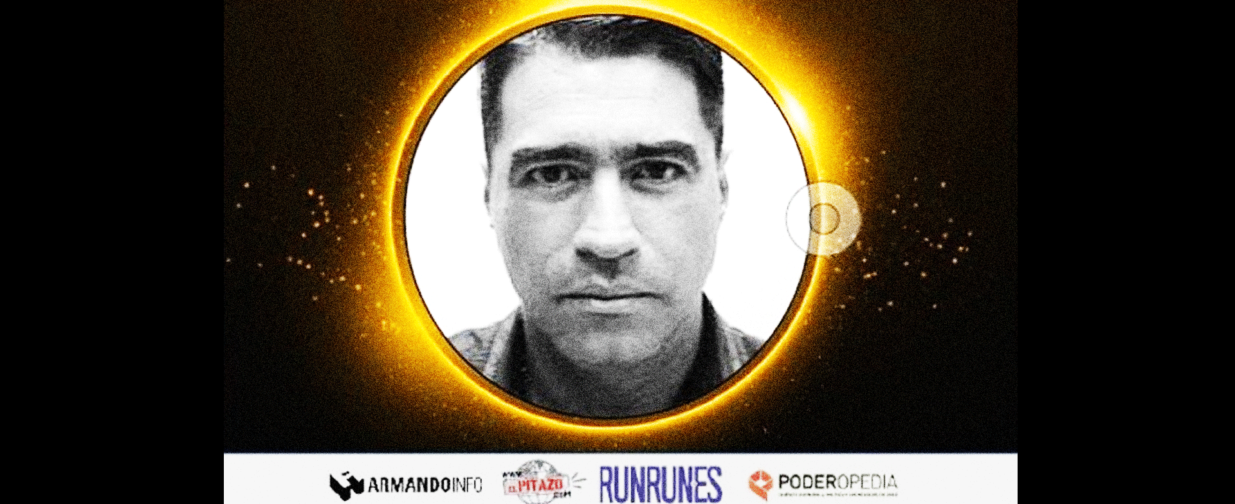
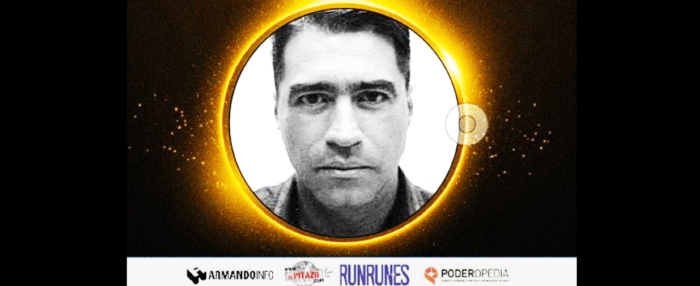
Carlos Erik Malpica Flores is one of the most powerful civilians in Venezuela because of his resources and positions held. He is the current treasurer of the Republic and administrator of PDVSA finances. He has had an astronomical career as a public official since he joined the government with the help of his aunt Cilia Flores and uncle Nicolás Maduro. For 10 years, he has managed to stay in the dark and carefully watch over the details of his management. His name began to resonate recently, after two young relatives of the First Lady were arrested for alleged drug trafficking in New York. Today, his identity is exposed, as well as a series of businesses in Panama associated with his relatives.
|
Getting your Trinity Audio player ready...
|
Although he never appears in public, the name of Carlos Erik Malpica Flores is linked to a series of recently created businesses. The family of the national treasurer registered 16 companies in Panama since Nicolás Maduro came to power in 2013. Quiet, low-profile, is the faceless power. But more importantly, he is Cilia Flores' favorite nephew.
Truths and lies are told about the first lady -first fighter in revolutionary-speak. But a side of her personality seems to admit no argument: she is a woman who helps, protects and defends her own in all circumstances.
It barely mattered that in 2008 the press found on the payroll of the National Assembly—back then under her iron-fist leadership—47 of her family members with positions in the organization chart. Nor has she seemed to care that on Wednesday, November 11, 2015, a nephew and a foster child were sent to prison in New York on charges of conspiring to introduce a shipment of cocaine into the United States of America, in what has undoubtedly been an unprecedented scandal in Venezuelan political history. Instead of dissociating herself from this, Cilia Flores opted to stay home and wait. Some families have a pact of silence and the Flores is among them.
However, Franqui Francisco Flores de Freitas and Efraín Campo Flores, those involved in the drug scandal in the U.S., are not Cilia’s favorite nephews, but the son of her sister Eloísa, Carlos Erik Malpica Flores, with much more power, consolidated at the presidential family’s side after his astronomical climb up the roads of public administration. Pdvsa Vice Presidency of Finance, a position he reached in late 2014, looks like the pinnacle of a career that began a few years ago, on September 28, 2005, with the position of Director General of Administrative Management and Services at the National Assembly (NA), while his political uncle Nicolás Maduro was chairing the Parliament.
A year later, he held a similar position in the Chancery when the then-President Hugo Chávez appointed Maduro Minister of Foreign Affairs. In late 2012, when Chávez was already terminally ill and Maduro was second in command, Malpica Flores joined the Vice Presidency of the Republic as Director General in charge of that office. Finally, when his uncle ascended into office, he consolidated his position as administrator of the country's finances. He has been assistant treasurer, director general of Bandes and Treasurer of the Nation, in that same order. Nowadays, he manages the national budget, additional credits and many financial funds that the economists qualify as non-auditable due to lack of reports and public balance sheets.
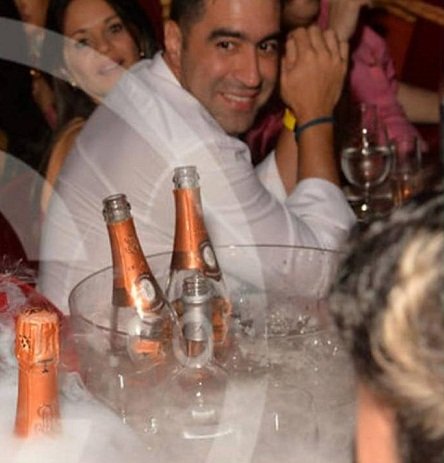
When comparing the number of positions held in the past and the present by Malpica Flores with those held by the rest of the family that participates in the Chavista bureaucracy, it is more than evident that he is the most trusted person of the Venezuelan presidential couple. He has wanted to repay that trust by avoiding the commotion and scandals associated with the display of power. In addition to avoiding being photographed in public, he has made sure that there is no trace of him in private and state media, including internal publications or websites of the institutions he has worked with.
Moreover, like many of the presidential family, he does not have accounts in social media. The tactic has worked for him, as some media confuse him with Temir Porras, former president of Bandes and former official of the Chancery, and once a favorite of President Maduro.
But all that effort to keep his a low profile collapsed with the arrest of his two relatives in Haiti. A photo shoot taken in December 2014 at a nightclub in Saint Barth, an island located in the eastern Caribbean, ended the will to hide.
No one refers to him by name. He is "Cilia's nephew", the voices of the National Assembly, the Ministry of Foreign Affairs, PDVSA and business circles in Valencia, the city where the Malpica and some Flores are settled, coincide. After his uncle and aunt, the president of the parliament and the president of the state oil company, he must be the most powerful civilian in Venezuela.
Those surrounding him are now aware of this situation and are making the most of it. Within nine months of being part of PDVSA board of directors, the administrator met his parents Carlos Malpica Torrealba and Eloísa Flores in Panama, in the same period (September 2-10) when 10 family businesses were registered in that city. His aunt, Evelyn Malpica Torrealba, traveled to Panama in previous days, while his sister came back to Venezuela from that country days after the business enterprise. The information is based on the analysis of migratory movements of the family and consultations made in the Public Registry of the capital of the Central American country. Likewise, it was determined that prior that curious week of September, the Malpicas had created two companies in 2014 and three in 2015 (from March to August). In October 2015, they added another one to their substantial inventory.
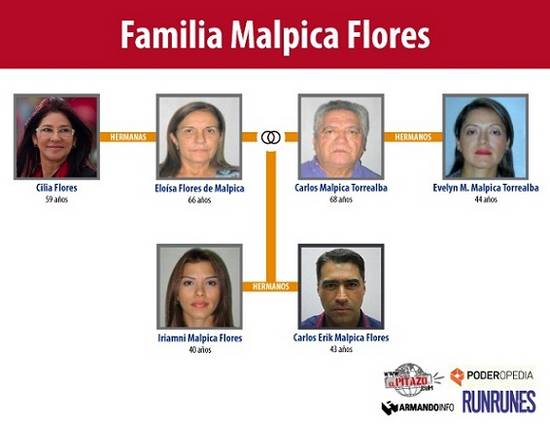
Each company opened in Panama was registered with an initial capital of US$ 10,000. The names of the companies suggest that it is a holding company engaged in maritime transport, one of Pdvsa branches: Seaside Services, Maritime Crews Inc., Oceans Investors Corp., Marine Administration Panama. However, that is just one of at least 30 objectives of each company. The articles of incorporation of all the companies establish the following objectives: purchase of furniture and real estate, hiring of personnel and transport services, property research, appraisals, purchase, sale, mortgage, encumbering of movable and immovable property, demolition, air and ground transportation, export, import, re-export, contracting, and participation in public and private tenders.
The sister of Carlos Erik, Iriamni, the paternal aunt, Evelyn Milagros Malpica, and the father, Carlos Evelio, participate in all these companies holding positions of president, director, subscriber, and treasurer. Evelyn, who presides over 11 companies and runs 16, stands out as the busiest, while Iriamni and her father opted for less responsibility.
Each of them is in charge of a company, but act as directors, treasurers or subscribers of shares in the rest of the conglomerate. Another coincidence in the business opening week (September 2-10) is that the treasurer, his father and mother used the same private plane to travel to Panama, but in different trips. Only Eloísa and Carlos traveled together in the Gulfstream aircraft, registration No. N896AC, from an aircraft rental company based in Fort Lauderdale, U.S.A. It is the same jet that Malpica Flores used between July and September to move to Panama, Fort Lauderdale, Aruba and Barbados. Conversely, the aunt and sister avoid flying with their relatives. Both travel with commercial airlines and charter flights.
Panama has fought for many years against the image of a tax haven hiding bad money. His government hopes that the nation will be removed from the gray list of countries with deficiencies in the fight against money laundering and terrorism financing prepared by the Organization for Economic Cooperation and Development (OECD). The great number of companies opened in short time by the relatives of a politically exposed person (PEP), as Malpica Flores, in a territory considered offshore financial center arises suspicions.
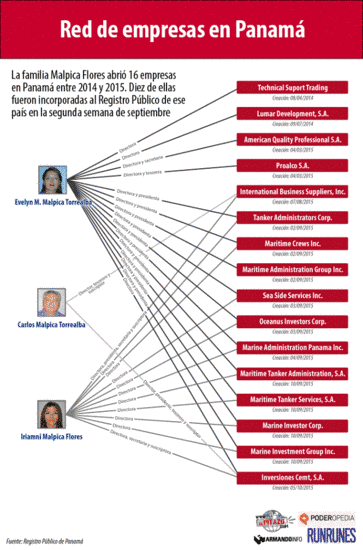
Sources checked in Panama indicate that the abundance of companies could have an operational purpose: the opening of bank accounts. The declared object of the companies suggests that the Valencian family wants to make the most of the advantages of the import-oriented economy in Venezuela to do business.
That may be the reason why the Valencian family, some of which already had experience as importers, began to leave their jobs since 2014, except Cilia Flores' sister, Eloísa. The father appears in the file of the Venezuelan Institute of Social Security (Ivss) as unemployed since August 2014. Evelyn and Iriamni, aunt and sister, respectively, resigned their jobs a month later and only a fortnight apart.
The treasurer does not appear holding any position in the management structure of the Panamanian companies, which seems consistent with the decision to keep up appearances. In the past—when there were less obstacles—Malpica Flores was with his own in the board of companies Inlasa and Redilama, registered in Valencia and engaged in “business operation of national and foreign product representation." Both companies were registered with the National Register of Contractors (RNC) in 2006, but do not currently qualify to do business with the State.
Carlos Erik is 43 years old and was born on September 17, 1972. In his passport photo, he looks like a light-brown skin man, with a thick nose, side hairstyle, without obvious line, wavy hair, and a wary look. The bitter moment experienced by his cousins ??in U.S.A. has forced him to take precautions. This week, there have been changes in the surroundings of his residence in La Viña de Valencia, Carabobo state, which he shares with his wife Carmen Hurtado, as the neighbors widely comment. It has been observed typical movements of someone who has made decisions, such as moving things from their place and moving at night. Until a week ago, there were always 8 cars, 10 escorts and 4 bikes in front of the house. Also garbage boxes that revealed a luxurious consumption of groceries - Moët & Chandon champagne, among others - and clothing. Now, the home is like the others, alone and guarded by a private guard from a guardhouse a few meters away.

He qualified as an administrator in December 1999 at Universidad de Carabobo. In 2001, he got a graduate degree in Marketing. Ten years later, in February 2011, he earned a basic salary of Bs. 13,327 monthly, plus a premium per child and food tickets for his performance in the position of Administrator III. More than the salary, perhaps what is striking in the Chancery, where the Valencian worked as the closest man to Nicolás Maduro, is that the family life pattern changed a lot with the rise of his political uncle. "Everyone knows that Carlos Erik moved his family from Venezuela to Panama, and that they have many companies there," says a ministry source who knew him well during his years of service.
In the Casa Amarilla (Yellow House) he was also known with the long motto of "Cilia’s nephew". He never arrived early to the office, but rather toward the end of the day, and a glass of whiskey awaited him at his desk. He stayed in his office until midnight. He wore guayaberas, blue jeans and Timberland boots.
His most visible work, according to some, was the extensive remodeling of the tower of the Chancery on Avenida Urdaneta and the Yellow House, as well as the National Assembly. Because of his eagerness to restructure, many accuse him of destroying property. Part of the extensive black marble floor, characteristic of the great hall of the ministry tower, former headquarter of Banco Nacional de Descuento, was broken and removed. In any case it was a work that had a brief life. After the torrential rains of 2010, the impact of the relocation of the victims to both buildings -ordered by Hugo Chavez- deteriorated the renewals.
In those days, the nephews and children of Cilia Flores, the son of Nicolas Maduro, returned with their school uniforms, walked through aisles and offices and put their feet on the old mahogany furniture tables, affirmed a witness of that misbehavior. The boys ordered food to the chef of the Yellow House as if it were a delivery service. They were also seen getting out of the ministry parking lot with brand new SUVs, like Hummers, which had been confiscated by the government from banks during the 2009 mini financial crisis, sources said.
While his cousins ??ran through the corridors, Malpica Flores, due to his administrative duties, had to deal with the demands of the union of the Chancery. Although the then Minister Maduro had signed the bargaining agreement in 2007, Foreign Affairs employees waited almost six years to receive the 25% salary increase promised to them every 12 months.
The administrator disbursed the resources agreed with the workers shortly before completing his management. In those meetings of claims, two sources that knew of the negotiations affirm that the official did not accept being antagonized. "He was very arrogant. He listened to us with respect, but did not pay the increases agreed. Of course, he wore stylish clothing. Always Impeccable," said a former employee.
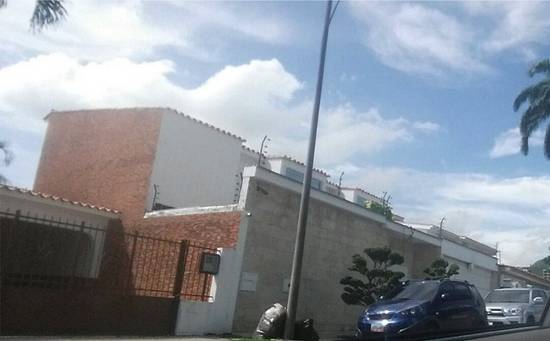
The imprisonment of his cousins ??Efraín Campo Flores and Franqui Francisco Flores de Freitas has uncovered the mysterious veil surrounding Malpica Flores. Without a suit, dressed casually as when he talked to the union, he appeared in a photo taken in December 2014 at the best nightclub in Saint Barth (or St. Barthélemy), a French overseas territory in the eastern Caribbean, north of Guadeloupe. He was spending time with a group of friends and family. Precisely in that month, his appointment as a member of the board of directors of PDVSA was published in Official Gazette. It is worth noting that when Maduro made the appointment on television, he refrained from pronouncing his maternal surname.
The photo was posted on a fake Twitter account in early 2015, but it is more relevant know in view of the context of the current presidential scandal. Runrunes, Armando.info, Pitazo and Poderopedia have been able to check with two independent sources that the man dressed in a white shirt to the extreme left is Malpica Flores. Right behind him is José Simón Elarba, a member of the Board of Directors of El Nacional, Elarbas’ son-in-law, Henry Camino Muñoz, and his wife Mariana.
Elarba is one of the shareholders who publicly criticized El Nacional for publishing a release, based on information collected from the newspapers ABC and The Wall Street Journal, which says that the president of the National Assembly is being investigated by the United States of America for his alleged relation to drug trafficking. The entrepreneur is also linked to oil business in the east of the country.
Malpica Flores did not respond to several calls made this week asking him to explain the expansion of his family businesses in Panama and other countries. There were no answers in the National Treasury Office, located in the parking lot of the building attached to the Ministry of Finance, where you can get bypassing a pile of air conditioners and crossing the threshold of a back door. When we called the next day, the secretary added: "He did not come today or yesterday." The office of the Vice President of PDVSA, where another letter was delivered, has not answered either.
His house in the La Viña development in Valencia was the third place visited. A maid confirmed that he resided there and kindly received the correspondence. In front of the house, there were only two cars parked, a low transit street, and certainly, a community of neighbors who from now on, will not be the only ones recognizing the face of the person keeping the safe of the country's finances.
(*) This work is a collective project of the media ArmandoInfo, El Pitazo, Poderopedia , and Runrunes, coordinated by Fabiola Zerpa. Covered by journalists César Bátiz, Lisseth Boon, Cristina González, Alfredo Meza, Katherine Pennacchio, Joseph Poliszuk, Ronna Rísquez and Ewald Scharfenberg; with the collaboration of Tibisay Romero (Valencia) and Grisel Bethancourt (Panama). The design was made by Carmen Riera and Daniela Dávila.
Adrián Perdomo Mata has just entered the list of sanctioned entities of the US Department of the Treasury, as president of Minerven, the state company in charge of exploring, exporting and processing precious metals, particularly gold from the Guayana mines. His arrival in office coincided with the boom in exports of Venezuelan gold to new destinations, like Turkey, to finance food imports. Behind these secretive operations is the shadow of Alex Saab and Álvaro Pulido, the main beneficiaries of the sales of food for the Local Supply and Production Committee (Clap). Perdomo worked with them before Nicolás Maduro placed him in charge of the Venezuelan gold.
Gassan Salama, a Palestinian-cause activist, born in Colombia and naturalized Panamanian, frequently posts messages supporting the Cuban and Bolivarian revolutions on his social media accounts. But that leaning is not the main sign to doubt his impartiality as an observer of the elections in Venezuela, a role he played in the contested elections whereby Nicolás Maduro ratified himself as president. In fact, Salama, an entrepreneur and politician who has carried out controversial searches for submarine wrecks in Caribbean waters, found his true treasure in the main social aid and control program of Chavismo, the Clap, for which he receives millions of euros.
While the key role of Colombian entrepreneurs Alex Saab Morán and Álvaro Pulido Vargas in the import scheme of Nicolás Maduro’s Government program has come to light, almost nothing has been said about the participation of the traders who act as suppliers from Mexico. These are economic groups that, even before doing business with Venezuela, were not alien to public controversy.
Even though there are new brands, a new physical-chemical analysis requested by Armando.Info to UCV researchers shows that the milk powder currently distributed through the Venezuelan Government's food aid program, still has poor nutritional performance that jeopardizes the health of those who consume it. In the meantime, a mysterious supplier manages to monopolize the increasing imports and sales from Mexico to Venezuela.
Turkey and the coastal emirates of the Arabian Peninsula are now the homes of companies that supply the main social -and clientelist- program of the Government of Venezuela. Although the move from Mexico and Hong Kong, seems geographically epic, the companies has not changed hands. They are still owned by Colombian entrepreneurs Alex Nain Saab Morán and Álvaro Pulido Vargas, who control since 2016 a good part of the Import of food financed with public funds. Around the world for a business.
Since its opening in 2017, the Porsche Design Tower quickly became a symbol of luxury and ostentation in South Florida. Magnates from all over the world retreat behind the discretion of its tinted glass windows and virtually anonymous legal entities. But in recent days, two police investigations into illegal financial flows from abroad placed the building under an inconvenient spotlight. The justice just seized an apartment of over five million dollars from a Venezuelan agent.
When Vice President Delcy Rodríguez turned to a group of Mexican friends and partners to lessen the new electricity emergency in Venezuela, she laid the foundation stone of a shortcut through which Chavismo and its commercial allies have dodged the sanctions imposed by Washington on PDVSA’s exports of crude oil. Since then, with Alex Saab, Joaquín Leal and Alessandro Bazzoni as key figures, the circuit has spread to some thirty countries to trade other Venezuelan commodities. This is part of the revelations of this joint investigative series between the newspaper El País and Armando.info, developed from a leak of thousands of documents.
Leaked documents on Libre Abordo and the rest of the shady network that Joaquín Leal managed from Mexico, with tentacles reaching 30 countries, ―aimed to trade PDVSA crude oil and other raw materials that the Caracas regime needed to place in international markets in spite of the sanctions― show that the businessman claimed to have the approval of the Mexican government and supplies from Segalmex, an official entity. Beyond this smoking gun, there is evidence that Leal had privileged access to the vice foreign minister for Latin America and the Caribbean, Maximiliano Reyes.
The business structure that Alex Saab had registered in Turkey—revealed in 2018 in an article by Armando.info—was merely a false start for his plans to export Venezuelan coal. Almost simultaneously, the Colombian merchant made contact with his Mexican counterpart, Joaquín Leal, to plot a network that would not only market crude oil from Venezuelan state oil company PDVSA, as part of a maneuver to bypass the sanctions imposed by Washington, but would also take charge of a scheme to export coal from the mines of Zulia, in western Venezuela. The dirty play allowed that thousands of tons, valued in millions of dollars, ended up in ports in Mexico and Central America.
As part of their business network based in Mexico, with one foot in Dubai, the two traders devised a way to replace the operation of the large international credit card franchises if they were to abandon the Venezuelan market because of Washington’s sanctions. The developed electronic payment system, “Paquete Alcance,” aimed to get hundreds of millions of dollars in remittances sent by expatriates and use them to finance purchases at CLAP stores.
Scions of different lineages of tycoons in Venezuela, Francisco D’Agostino and Eduardo Cisneros are non-blood relatives. They were also partners for a short time in Elemento Oil & Gas Ltd, a Malta-based company, over which the young Cisneros eventually took full ownership. Elemento was a protagonist in the secret network of Venezuelan crude oil marketing that Joaquín Leal activated from Mexico. However, when it came to imposing sanctions, Washington penalized D’Agostino only… Why?
Through a company registered in Mexico – Consorcio Panamericano de Exportación – with no known trajectory or experience, Joaquín Leal made a daring proposal to the Venezuelan Guyana Corporation to “reactivate” the aluminum industry, paralyzed after March 2019 blackout. The business proposed to pay the power supply of state-owned companies in exchange for payment-in-kind with the metal.